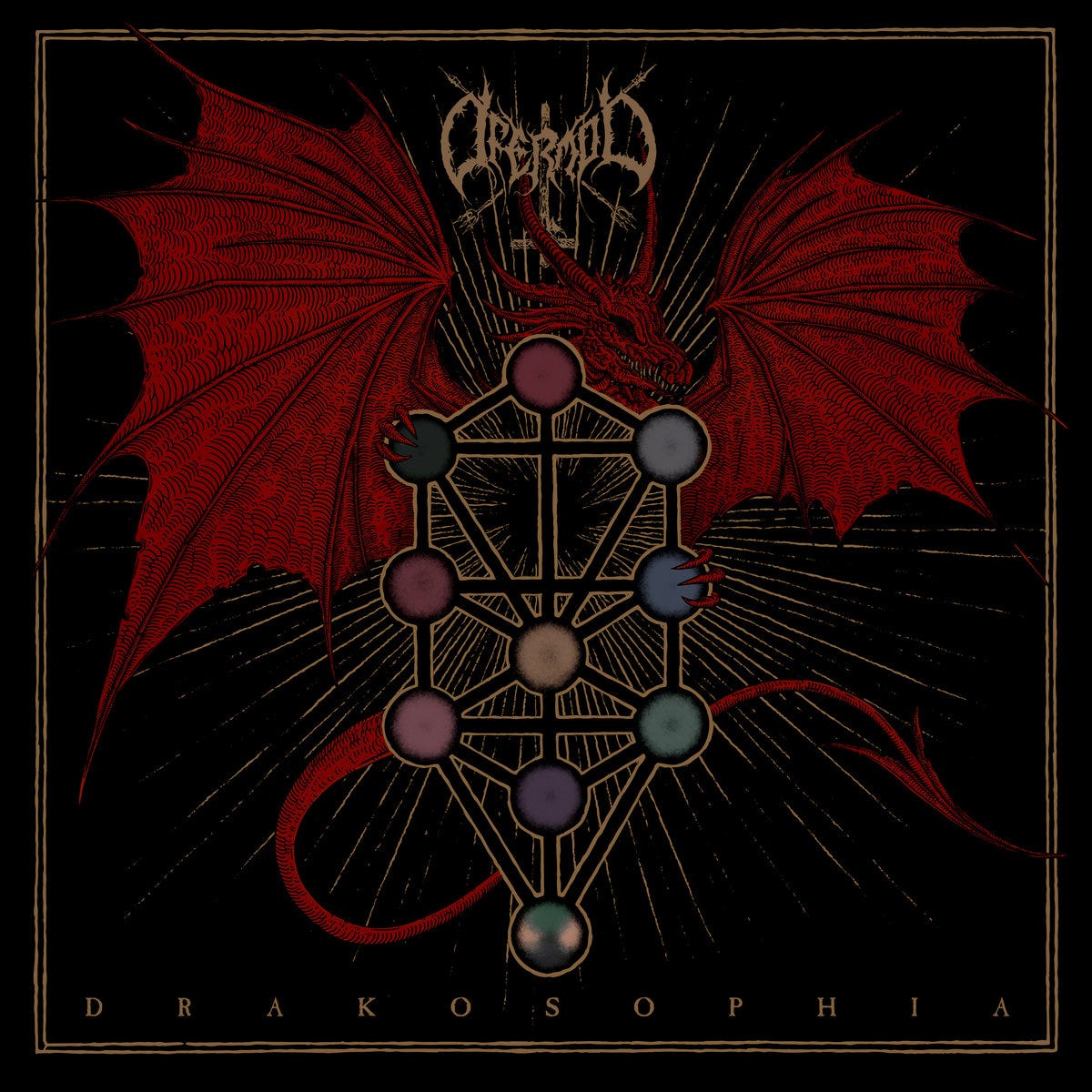REVIEW: Ofermod - Drakosophia
For he hath broken the gates of brass
00:44:51 // October 3rd, 2025 // Regain Records
With their first EP Mysterion tes Anomias in 1998, Ofermod channeled a severity and arcane intent that would ripple far beyond its brief runtime. Many of the genre’s defining artists trace their lineage back to the frigid atmosphere and aesthetics initially crystallized in the ‘90s on releases like this (other primary examples of the same era include early Nefandus, Funeral Mist’s debut EP, Malign and Hirilorn). Efforts on full length works arrived a decade later, when the band had molded its sound with the force of modern Swedish black metal, similarly to post-2003 Armagedda and Ondskapt (in Tiamtü and Thaumiel), and intertwining aggression with the delicate but menacing sense of melody communicated by bands like Watain and Valkyrja (especially in Sol Nox).
Years of continuous evolution allowed for deeper excavations into heavily conceptual territory, and 2021’s Mysterium Iniquitatis showcased Ofermod’s now trademark, rite-like body of work, which expanded further than the strict influences from aforementioned entities and refused to be merely retrospective. Anchored to the savage roots that first defined them, but still exploring esoteric themes with even greater nuance, Drakosophia is the latest chapter in this stubborn grimoire of occult black metal that pushes the band into a more viscerally muscular register. The record speaks in razor-taut riff craft that blends ritualism and brutality, occupying distinct space between foundational orthodox black metal and death-tinged heaviness that makes the spine prickle, and leaves nothing but rugged bits of gristle behind.
Contextualizing Drakosophia within Ofermod’s back catalog enriches the listening experience. Previous releases mapped various corridors of the band’s obsessions with metaphysical rupture, and the new album feels like the furthest step toward a synthesis of those corridors, as a consolidation of structural force without jettisoning the liturgical preoccupations that define them. Fans who have followed the band throughout will recognize the continuity, yet newcomers will come across something both dense and notably immediate. The record’s central axis lies in its immersion to a rigorously demanding strand of chaos-gnostic philosophy, a theme also murmured by acts like Serpent Noir and Acherontas (even though the latter stresses more on the ceremonial slow-burns).
Guitar lines coil and seethe, opening like altars and then tightening into riff precision that pushes and ornaments momentum. There’s emphatic success in the balance of the album, as the band’s power resides in mood, cadence and the authority of the ceremony, with all of the music’s elements present and sharpened. While the genre’s excesses in bombast or opacity are not avoided, Ofermod offers a marriage of compositional clarity and modern production while transposing textual narratives into structural gestures, rather than just lyrical slogans. Drakosophia’s polished sound is exceptional and preserves heft, while instruments sit in an audible field, alive and tactile. This clearer frame makes the band’s compositional intricacies more evident, motifs recur with purpose and shifts in tempo or texture read as fine compositional architecture instead of mere happenstance.
Potent dynamics soar all across the record, with highlights to me being “Vineyards of Gomorrah”, “The Painful Movers” and the self-titled track. The pieces are additionally enhanced by a stylistic vocal elasticity that fuels Drakosophia’s dramaturgy: narrative choral clean chants that howl in the background, fiercely expressing Ofermod’s doctrinal repudiations. These vocals can be found in most of the album’s tracks, and often help significantly with its flow and intensity, e.g. in the transition from “Malat Atat” to “Zazas Zazaz Nasatanadas Zazas”. However, a handful of moments favor ritual repetition over expansion, and in my view, these passages could benefit from either more daring textural shifts or greater tonal variety (I felt this mostly at the penultimate track, “Sinister Acolyte”).
If the album has any weaknesses, they are minor and mostly subjective. A handful of moments favor ritual repetition over expansion, and in my opinion, passages that could benefit from either more daring textural shifts or greater tonal variety (e.g. in “Sinister Acolyte”). At times Ofermod’s deliberate pacing risks treading familiar ground rather than breaking it; a listener accustomed to the shock of constant novelty may find themselves yearning for a genuinely disorienting pivot. Yet comments like these sit beside stronger virtues: Drakosophia is coherent where many contemporaries are scattershot, and it delivers catharsis through accumulation rather than gimmick.
Ofermod’s vision remains steadfast, and possibly even more focused since the turn of this decade, when it comes to written and musical delivery. Drakosophia’s stature is convincing and announces itself as a vital reaffirmation of the band’s intentions since their birth almost 30 years ago. The small blemishes do little to diminish the album’s cold gravity, which otherwise imposes this genre’s enduring capacity for revelation and illumination. A continuation of their arc and an album that can be enjoyed already from its surface level, Drakosophia meets the standards and doesn’t come off as tiring even after repeated listens. A rewarding experience from a band in evidently great form.
8.5/10



Spookiness aside, your knowledge about all of these bands is impressive! Just don't feed it to ChatGPT or something, it could get some dangerous ideas.